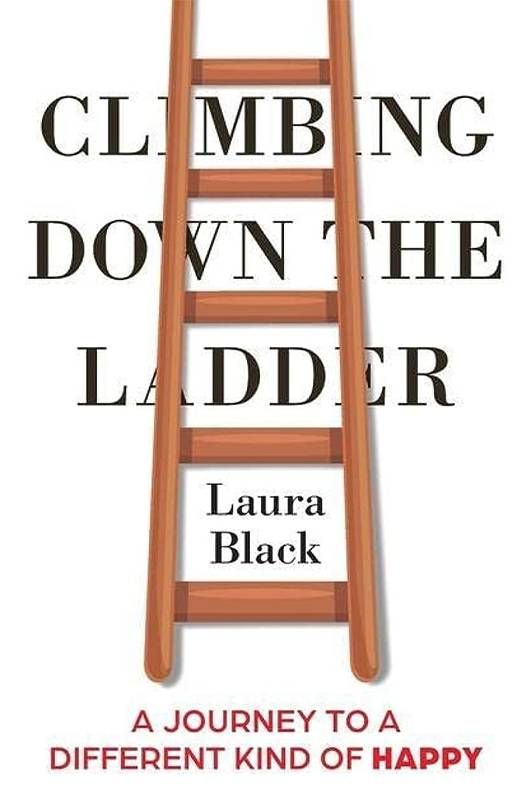How to Climb Down the Ladder (Without Tripping)
Stop working for straight A’s on the imaginary report card of retirement
One morning, soon after I retired, a friend called me to say, "It's been a while, when can we have lunch?" I scanned the calendar on my phone for a glimpse of the month ahead. The blank pages taunted me. Except for an early morning haircut and my weekly personal training sessions, I had nothing planned.
Trying to suppress my mounting anxiety I muttered, "whatever works for you."

When I climbed up the career ladder, as a mother of three, to help build one of the largest legal staffing companies in the country, my days overflowed with staff meetings, strategy sessions, industry conferences, carpools, Little League games and homework supervision. There was no time for lunch with friends.
Now, as a new retiree climbing down that ladder, with no business or childcare responsibilities, I found that I still maintained a high-energy level — but with no idea where to direct it.
How would I fill the day, the week, the month? Who was I without a business card?
After false starts, dead ends, research and exploration, the following five steps led me — and can lead you — to discover a different kind of happy. One that does not depend on what you do but on who you are:
1. Take off the blinders.
Up to this point of our lives, we've focused straight ahead on specific goals: earn good grades and admittance into a prestigious college, procure a job with a future, climb the ladder of success and reach the next mile marker.
This reality came home to me at the beach last summer as I watched an osprey flying overhead.
What else had I missed while plowing full steam ahead to meet my career goals?
It struck me: I had never before stopped to observe a bird fly.
I never realized that they soar — that they preserve their energy by only flapping their wings periodically.
What else had I missed while plowing full steam ahead to meet my career goals?
This is the time to remove the blinders and take it all in. Inhale the fragrance of shampoo before massaging it into your scalp, carefully listen when a friend shares details about her granddaughter's recital (even if you've heard them before), rub the silk of a favorite top between your fingers.
2. Identify what really motivated you in your career.
After you step down from the ladder, take a careful look back and identify what motivated your climb. I realized that my drive was based on the need to validate my worth — to compensate for the fact that I grew up feeling fat and unattractive in a South Florida culture that worshipped beauty. By succeeding in my business, I could prove that brains were more important than appearances.
Your community needs your help.
What drove your career success? Were you, like me, trying to prove your value? If so, you've most likely accomplished this goal and there is no reason to look for new ways to fill old voids.
On the other hand, perhaps your motivation was strictly financial. If so, part-time work, consulting or other arrangements are options. Maybe you thrived on challenge and competition. In that case, seek out new areas in which to compete, perhaps through sports or bridge.
If you were driven by altruistic goals like aiding vulnerable populations, a multitude of nonprofits can benefit from your help. Perhaps you relished the camaraderie and friendships of co-workers. You can still get together socially and cultivate new friends by taking a class or joining a group.
Once you pinpoint the source of your ambition, assess if that same need still exists and, if so, seek new paths to fulfillment.
3. Expand the other areas of your life.
Imagine your life as a wheel divided into seven sections: career, relationships, learning, leisure, community, health and spirituality. Until now, you've spent most of your time in the career section. Now is an opportunity to expand those other six areas.
Expand and deepen your relationships by eating lunch with adult children at their office, inviting a new neighbor for coffee or visiting a cousin and mulling over family pictures. Learn new skills and delve into new subject areas.
Whether you're interested in speaking French for an upcoming trip to Paris, taking a course in art appreciation at a local museum, or brushing up on technological skills, you have the time.
Likewise, indulge in guilt-free leisure. It is OK to spend an afternoon buried in a romantic novel, catching up on a TV series, jumping on the pickleball trend, or taking in the sunset from a canoe.
Your community needs your help. Whether you volunteer at an aquarium, read to under-achieving children, visit with the residents of a nursing home or run a campaign to fund equipment for a local hospital — needs abound, and it is incumbent upon us to step up where we can.
Make health a priority. There are no longer justifications for delaying doctor appointments or using the "I don't have time" excuse for foregoing exercise. Take this newfound opportunity to stroll down grocery aisles, read labels, select healthy choices and try new recipes.
It is OK to spend an afternoon buried in a romantic novel, jumping on the pickleball trend, or taking in the sunset from a canoe.
Expand your spirituality to develop a sense of serenity and connection. Consider attending religious services, going on a retreat, or simply taking long meditative walks in the woods. Dig deep to discover or enhance your connection to nature or a higher power.
By enhancing your relationships, learning, leisure, community involvement, health and spirituality, your time will overflow into the void left when work obligations have ended.
4. Accept that the loss may be larger than you realize.
When we leave the workforce, we often experience a loss of identity, meaning and purpose. To make matters worse, this occurs at the time of life when we are dealing with other kinds of challenges and losses: the ailments and eventual deaths of parents, children moving out of the house and forging lives of their own, friends and relatives coping with dementia or cancer.
Our own physicality diminishes. Body parts dry, droop or lose their functionality. Because of funky knees, I must cling to my husband's arm when we hike up the hill to watch our grandsons' baseball games. My trifocals have added to my fear of driving on unfamiliar multilane highways. And sitting on the floor to play with my dog, Einstein, requires concerted effort.
Start by dropping all those arbitrary 'shoulds' from your life.
We lose relevance, experience marginalization. I no longer recognize the names of nominees on music award shows. Technology has become challenging, simply parking my car with an app is cause for pause. I'm now clueless when it comes to fashion. What color lipstick is in? Can I wear boots with a dress? How about pantyhose — nude or black?
It's important to acknowledge these other losses and understand that they add to the weight of adjusting to retirement.
On a positive note, awareness leads to acceptance. We come to see that while loss is painful, it is inevitable. Acceptance frees us to move forward. We learn to focus on what we have, not what we lost.
5. You no longer need to prove anything.
We spent our lives striving to climb that ladder with proficiency, competency and excellence. At the same time, we sought to be model parents, caring adult children, attentive spouses, reliable siblings and friends. We tackled myriad other tasks and responsibilities with grace and dignity.

Enough. Now it's your turn. It's time to focus on yourself.
Like trading in stilettos for flats, go ahead and swap martyrdom for personal indulgences.
Start by dropping all those arbitrary "shoulds" from your life. It is okay to buy a purple top just because you like it. Eat ice cream for breakfast. Go to bed with dishes in the sink. Say no to an invitation to dinner with people whose company you don't enjoy. Stop reading a book if you're bored. Sing out loud with emotion, even if you can't hold a tune.
It's a shame to go into this stage of life feeling you still have to prove your worth. You do not have to be the best golfer, the kindest grandparent, the most proficient hostess, nor the busiest. Instead, let love, enjoyment, gratitude, caring and curiosity be your guides.
Stop working for straight A's on the imaginary report card of retirement.
You no longer need to prove anything.
You've done enough.
You're good enough.
You are enough.


